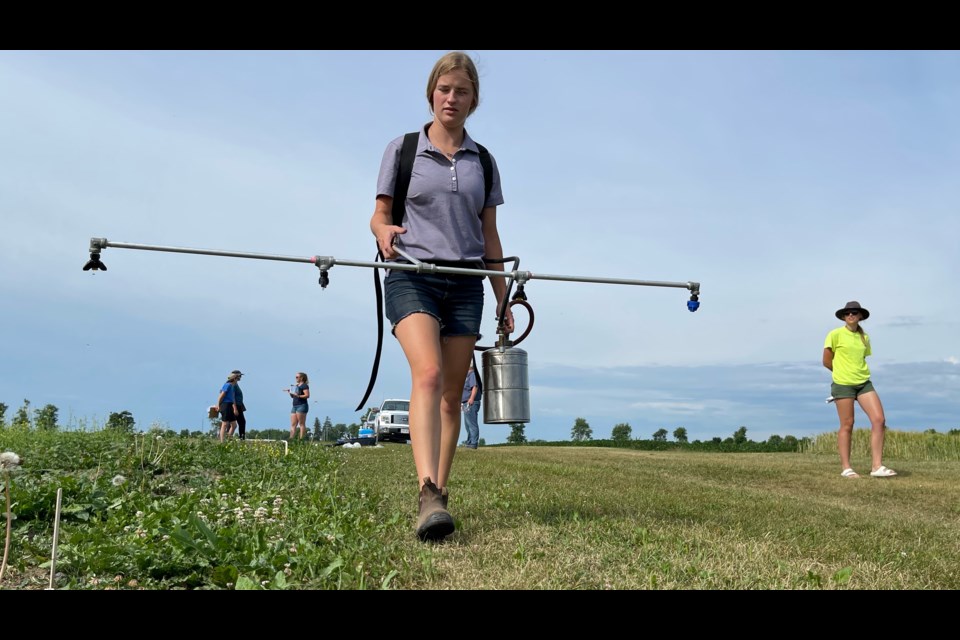Weed science students from far and wide will descend upon Plattsville this Wednesday, when the University of Guelph and Syngenta host the Northeastern Weed Science Society's Collegiate Weed Science Contest.
The event is slated for the Syngenta Honeywood Research Facility where the one-day competition is expected to see about 50 students from seven universities test their knowledge and skills in five different events.
"It can get pretty intense," said Francois Tardif, a U of G professor specializing in weed sciences and coach of the university's team.
"Students perform individually … but scores will be pooled together so you want to do well for yourself, but you want to do well for your teammates as well."
"It's for fun, but it is a competition at the end of the day," added Marinda DeGier, a first-year graduate student doing her masters at U of G. "I know I felt some nerves (when I last competed as an undergraduate in 2016) cause you want to try and do well. You are judged based on an individual level, but then you're also (in) teams."
DeGier is part of a graduate team of three. The U of G is sending multiple undergraduate and graduate teams south of Hwy. 401 to compete, with other schools south of the border doing the same.
U of G is the lone Canadian university competing. The others are all based in the United States: Clemson University, Penn State University, Cornell University, Virginia Tech, North Carolina State University and Rutgers University.
Five different events are held, from testing the students' ability to identify different types of weeds, measuring and applying proper herbicide spray, identifying unknown herbicides, problem solving and making recommendations to farmers.
All but one event is individual. The lone team event will see students race against time to properly equip themselves with CO2-powered backpacks, complete with proper nozzles and strainers to apply herbicide to crops.
Now, that sounds easy on the surface.
However, the herbicide has to be applied in the right amount, the correct height, the correct pattern and the right speed.
One of the four individual events requires students to figure out these things on paper before the physical application.
If teams get it wrong in the written phase, they're given the correct answer to properly calibrate their equipment in the team event.
"I'm very excited, (and) a little nervous," said Hannah Symington, a second-year graduate student at U of G. "I haven't had as much time as I would've liked to have had to prepare, but I'm definitely very excited."
Dry weather has been the norm in Guelph lately, forcing the city to tighten up water restrictions.
Could that play a role Wednesday?
"All of the grower problems are generally quite pertinent to current agriculture," Symington said. "I'm very curious to see whether perhaps they bring that dryness component into the competition in some way."
The competition has been around since the 1980s, with a different location is chosen each year.
This is the first time U of G is hosting since 2000, when the event was held at the Elora Research Station.
"The Northeastern Weed Science Society had been expressing interest in coming back to Canada since 2018," said coach Tardif. "And it didn't happen for different reasons, except for this year."
He said while the local side is in more of a rebuilding phase — 10 rookies and four or five veterans make up the Guelph entry — and expectations aren't as high as in previous years, the goal isn't necessarily to win, but to learn.
"It's a different way of looking at it," Tardif said. "It's more hands-on. In school, you're given exercises and you have things to study, but when you graduate and you become an agronomist, you visit a farmer's field. It's real life.
"Farmers may have $20,000 worth of seed invested in the field, and $10,000 worth of herbicide. What you recommend may make a big difference in terms of profit, success or failure."
DeGier, who once worked for TD Bank in their agriculture lending department, is aiming for a job as a field biologist after she completes school.
"It's the trial work that's done ahead of time before any product goes to market for farmers," she said. "It all has to get tested and approved by PMRA, the Pest Management Regulatory Agency through Canada."
Once the competition is complete, a banquet is held in the evening, where awards are handed out.
"Events like these are priceless," added Symington. "This is one of those networking opportunities that it doesn't really matter what you know, but it's more so who you know. An event like this really allows you the opportunity to (talk to people with a common interest).
"It's kind of crazy, the connections that you can form."
